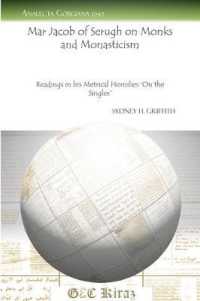- ホーム
- > 洋書
- > ドイツ書
- > Humanities, Arts & Music
- > Linguistics
- > slavic linguistics
Full Description
The Everyday of Memory explores manifestations of the communist past in the everyday lives of Eastern Europeans today. Representing a wide range of disciplines including cultural studies, film studies, urban studies, sociology, media, literature and art, the contributors to this book question the myth of a homogeneous Eastern European identity (as opposed to its historical Western counterpart). At the same time, they insist that those who experienced communism have a 'right to remember', and that their memories offer an alternative to the project of globalizing capitalism.
The volume presents a critique of the current withdrawal of Eastern European politics from discussion of the communist past, in which the latter tends to be regarded as an obstacle to the neoliberal transition to democracy. As the book's microstudies of the everyday life of memory show, communism has never been isolated from its capitalist nemesis: the two systems have been intertwined in the post-Enlightenment interplay of the humanist ideals that underpin the modernist project. Through a close observation of the unconstrained ways in which memory works, this book offers an insight into the paradoxes of the two ideological powers which posited the subservient homo sovieticus against the civilized homo economicus. The book also invites debate about the contemporary relevance of the ideological polarization of communism and capitalism.
Contents
Contents: Marta Rabikowska: The Memory of the Communist Past - An Alternative Present? - David Williams: 'The loser bug has made its way into our hearts': Literature and the Ruins of the Everyday - Kate Duncan: In Peter's Cellar - Ferenc Hammer: Teenage Metamorphoses: Elements of Change in First-Person Memories about the First Pair of Jeans - Ben Gook: Something's Always Left Over: Putting the GDR on Film in Heise's Material - Joanna Zylinska: Will You Ever Go Back? - David Mabb: Art into Everyday Life - Blagovesta Momchedjikova: The Way the City Makes Me Feel: An Investigation into Urban Sensibilities in Post-Communist Sofia - Andreea Lazea: Urban Landmarks Between Memory and Uses: The People's House in Bucharest - Pavla Alchin: Requiem for the Partisan: Towards the History of the Odehnal's Chata (not necessarily in chronological order) - Mariana Markova: Continuity or Change: Biographical Narratives of the Last Soviet Generation - Marta Rabikowska: The Everyday of Memory in the Ruins of the Post-Communist Future: Performative Nostalgia, Perception and Narrating Identity - Oleksandra Shchur: Ukrainian Women between Communism and Post-Communism: Memory and the Everyday of Ideology in Oksana Zabuzhko's The Museum of Abandoned Secrets - David Cunningham: Afterword: Communism, Modernity and Memories of the Everyday.







